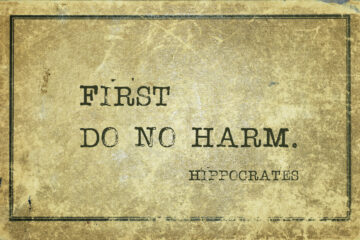“Where, after all, do universal human rights begin? In small places, close to home – so close and so small that they cannot be seen on any maps of the world. Yet they are the world of the individual person; the neighborhood he lives in; the school or college he attends; the factory, farm or office where he works. Such are the places where every man, woman and child seeks equal justice, equal opportunity, equal dignity without discrimination. Unless these rights have meaning there, they have little meaning anywhere. Without concerned citizen action to uphold them close to home, we shall look in vain for progress in the larger world.” – Eleanor Roosevelt
Protection from Medical Condition Discrimination in the Marketplace
S.B. 0320 proposes an amendment to the Tennessee Human Rights Act to protect against discrimination by businesses on the basis of one’s medical status. Specifically, one may not be denied equal enjoyment of goods and services based on whether they are wearing a medical device or have received any form of medical treatment.
International corporations such as Target, Costco, Walmart and others now systematically impose broad restrictions as a condition of access to their places of business, and these restrictions often exceed those mandated by state and local governments. Individuals who enter these establishments and, for reasons of privacy and personal autonomy, choose not to disclose their medical condition or wear a medical device such as a facial covering, are subjected to harassment, intimidation, and even personal assault. While most mask mandate orders contain a medical exemption for those with diagnosed illnesses or conditions, these are routinely ignored by these retail conglomerates. The purpose of these exemptions is to assure that a person who is unable to wear a face mask is granted a reasonable accommodation and allowed to participate in, or benefit from, the programs offered or goods and services provided to the public as a whole. S.B. 0320 extends this obligation of reasonable accommodation to private businesses that provide goods and services, and it prevents discrimination on the basis of their medical status or whether they wear any medical device.
This proposed legislation is vital to protect against discrimination and harassment by businesses that condition one’s access to goods and services on their willingness to submit to medical inquiries about their personal medical condition, or whether they can produce medical evidence of having received a vaccination or form of medical treatment? Already, some governmental entities have enacted ordinances that require individuals claiming an exemption from the mask mandate to carry with them medical documentation to prove their entitlement to the exemption.
There is ample legal and constitutional support for S.B. 0320. The denial of goods and services based on one’s private medical status has long been prohibited in the context of the Americans With Disabilities Act.
In addition, private employers are prohibited from inquiring into an employee or prospective employee’s medical condition. The Rehabilitation Act prohibits covered entities, including the EEOC, from “mak[ing] inquiries of an employee as to whether such employee is an individual with a disability or as to the nature or severity of the disability, unless such … inquiry is shown to be job-related and consistent with business necessity.” The public policy justification underlying this legislation is the protection of one’s privacy and personal dignity. There simply is no legitimate justification for compelling the disclosure of one’s confidential medical records or information a condition of access or enjoyment of the same the rights and privileges enjoyed by others. Moreover, once such confidential information is disclosed to the proprietor of a business or the contracted security officer for Target or Walmart, what guarantee does one have that the information will not be further disseminated?
S.B. 0320 protects these same constitutional interests by assuring to all individuals the full and equal enjoyment of access to goods and services and forbidding discrimination by commercial providers who either prevent access altogether or impose burdens on those seeking by conditioning such access on the surrender of their personal privacy and an impermissible inquiry and intrusion into their medical status.
Some have argued that the proposed bill will undercut private property rights of business owners. This argument is flawed for several reasons. First, there is no constitutional right as a business owner to arbitrarily deny one class of individuals access based on their medical status, or their willingness to produce medical documentation or submit to an interrogation regarding their exemption from wearing a medical device. Secondly, the personal liberty interests of individuals to be free from unwarranted intrusion into their private, medical status outweigh the corporate interests of commercial entities which must take into account the discriminatory nature of their practices. Finally, the ownership of commercial, private property does not confer the right to coerce, intimidate, threaten or interfere with a person on the basis of their medical status or condition. S.B. 0320 is a necessary protection for individuals who today are forced with the decision to face stigmatization in the local marketplace or forfeit their privacy interests. To quote from Roosevelt: “Unless these rights have meaning there, they have little meaning anywhere. Without concerned citizen action to uphold them close to home, we shall look in vain for progress in the larger world.”
Larry L. Crain
Crain Law Group, PLLC
www.crainlaw.legal














